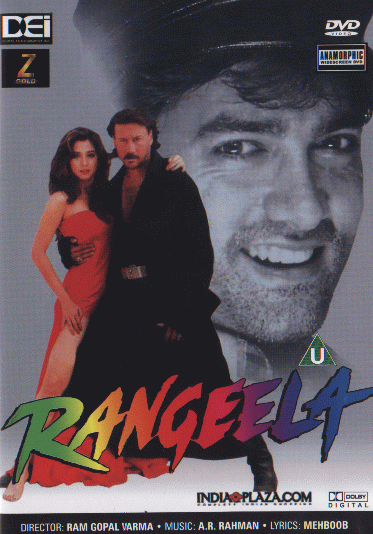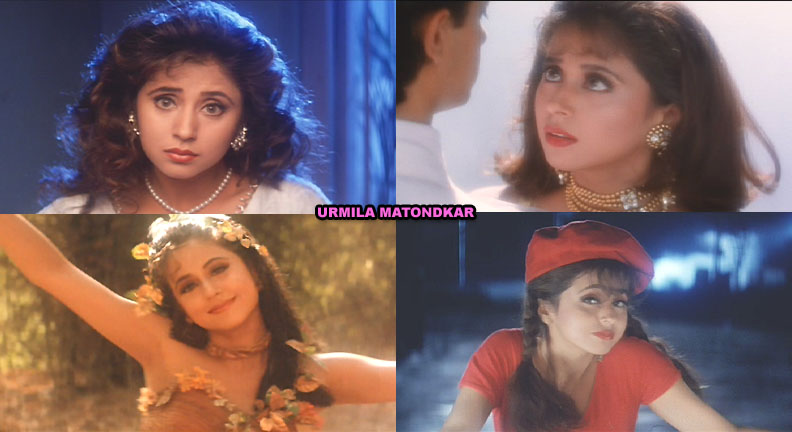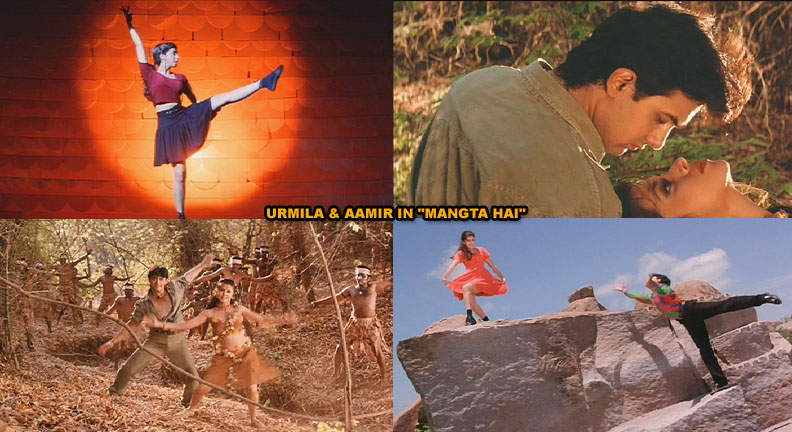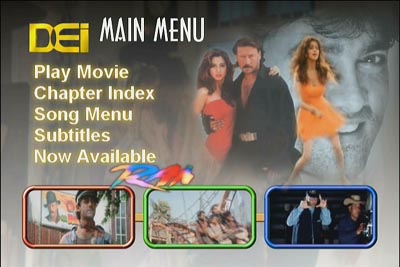 |
RANGEELA ("Colorful") (1994)
Produced, Written and Directed By Ram Gopal Varma
Music: A.R. Rahman Starring: Aamir Khan, Urmila Matondkar, Jackie Shroff, Gulshan Grover, Reema Lagoo, Shammi, Avtar Gill Running Time: 150 Minutes
CineRating: 8 out of 10
|
Demonstrating that even cliche-ridden storylines can become fresh again when a director cares enough about the lives of his characters, South Indian filmmaker Ram Gopal Varma has carved out something of a niche for himself as a director who takes overly familiar plots and reinvigorates them through an infusion of simple humanity and a refusal to sacrifice his multi-layered characters to the formulaic demands of the marketplace. While films such as the low-budget horror movie Raat (1991) and the hysterical thriller Kaun? (1999) suggest that Varma has equal affection for lowbrow exploitation as he does for high-minded art, he's at his best when he finds the middle ground between the two extremes and gives an offbeat and intelligent spin to a flailing genre, as he did to the gangster film with Satya (1998).

After his early, unconventional films received critical acclaim but little in the way of boxoffice support from Hindi-language audiences, Varma set out to prove with Rangeela that he could deliver a lavish Bollywood-style blockbuster. While the film's old fashioned plot -- a love-triangle revolving around characters who have difficulty verbalizing their love for one another -- is about as groundbreaking as an episode of Spin City, Varma's movie succeeds wonderfully on its own terms by boosting its worn-out premise with some well-deserved jabs at the Bollywood film industry while serving up Urmila Matondkar in a star-making role that she devours with her usual enthusiastic aplomb. Add in one of A.R. Rahman's most memorable scores as well as a bevy of stylish song-and-dance numbers, and it's easy to see why Rangeela ranks among the most popular and influential Bollywood musicals of the 90's. Indeed, Subhash Ghai co-opted a number of elements from the film's plot for his 1999 smash hit Taal which, despite an even more superb A.R. Rahman score, replaced the very real emotional power of Varma's film with Ghai's typically hamfisted attempts at melodrama.

Urmilla plays a winsome middle-class girl named Mili, who dreams of stardom while she works as part of a dance troupe in a film starring Bollywood idol Raj Kamal (Jackie Shroff). Munna (Aamir Khan) is a movie-ticket scalper who lives next door to Mili and yearns to take their close friendship to the next level. Brash and sometimes obnoxious, Munna is a "tapori" (a poor child of the streets) who carries a huge chip on his shoulder but is genuinely in love with Mili, only he's too afraid to tell her for fear of rejection. After Kamal becomes mesmerized watching Mili do aerobics on a beach (and believe me, you would too), he has her try out as a replacement for the film's departed female star. Although her audition is a disaster, Mili gets another chance and, after rehearsing her part with Munna, manages to ace the second screen test. Munna plans to propose to Mili, but finds more and more of her time being taken up by the movie business and Kamal, who has his own designs on Mili's heart. Munna tries to impress Mili by treating her to a fancy restaurant, but the ploy backfires when Kamal unexpectedly shows up. As he sees Mili inevitably slipping away from her middle-class trappings, Munna must finally make a choice between winning her back or letting her go.

As if to let the audience know right off the bat that he's not fooling around, Varma opens up Rangeela with the terrific song-and-dance number "Rangeela Re" (which immediately establishes Urmilla as a force to be reckoned with) and never looks back, filling up the movie's rather lean running time (for a Bollywood film, that is) with eight standout song-and-dance numbers (my favorite being "Kya kare Kya Na Kare"), most of which feature a staggering amount of wardrobe and scenery changes. The musical score was A.R. Rahman's first written specifically for a Hindi film, and his deft fusion of Eastern and Western styles blew a titanic hole through the tired old romantic standards that were infesting Bollywood movies at the time. Dancing up a storm throughout, Urmila has never looked better, and if you're not suitably dazzled by her infinite array of nimble and sexy dance moves than you're probably in need of some serious shock treatment.

Ram Gopal Varma's clear-eyed and level-headed approach to storytelling works wonders for Rangeela's overly familiar plot, keeping the film centered somewhere between the frivolous romantic rhapsodies of Subhash Ghai and the achingly serious drama of Mani Ratnam. The movie's tone is light but bittersweet -- one that celebrates the power of love, but is grounded in a realistic enough context to vividly convey the painful downside of romantic longing. Varma's empathy for life's "losers" puts him clearly on the side of the lowly Munna, but he's also graceful enough to show Kamal as a man whose hard-earned wisdom makes him an ideal alternative to Munna's callow impulsiveness. There are no real villains in Rangeela, and though Varma satirizes the eccentricities and egotism of those in the movie industry, he stops far short of making them targets of any real venom. It's to his credit that, as the movie progresses, it becomes less evident to the viewer which of Mili's suitors will end up with her, and, even more impressive, which one she would actually be better off with. Some might complain that the ending is a conventional Hollywood-style feel-good finale, but even here Varma takes a modest approach that runs counter to the melodramatic fireworks one associates with this genre. It's no huge spoiler to say that everybody turns up a winner at story's end, but then again, it's not quite in the way you might expect. For in that one final great shot of Jackie Shroff's character, Varma leaves it up in the air as to who is the biggest winner of all.

Urmila, who has starred in numerous Varma productions since Rangeela (including the 1999 movie Mast, a kind-of flipside to this film), is completely engaging as the ebullient young woman who is so enraptured by the world around her that she fails to notice how the two men in her life share a deep, romantic longing for her. As the headstrong Munna, Aamir Khan veers dangerously close to being an ass, but that soulful look in his eyes gets him off the hook every time. Varma's presentation of Munna as a hot-tempered, lower-class goof is refreshingly free of excessive sentimentality or ridicule, and in Khan he has an actor who can match Urmila's energy level step for step. Ably supporting the duo is Jackie Shroff (Parinda) as the veteran action star whose tragic past makes him as vulnerable to life's heartbreaks as Munna.

The DEI widescreen DVD release of Rangeela is presented in its original 2.40:1 aspect ratio (though slightly squashed) and features a new 5.1 mix. The picture is beset by the usual minor signs of wear and tear that one finds on most Indian DVD releases, but is otherwise pretty acceptable. There is an older DVD release from Media Digital that features a severely cropped picture and a newer release from Eros/B4U that has been criticized for its poor audio.
|
|
|
DVD Specs:
DEI DVD
All Regions
Anamorphic presentation
Removable English Subs (songs included)
No Extras
|
|
|

